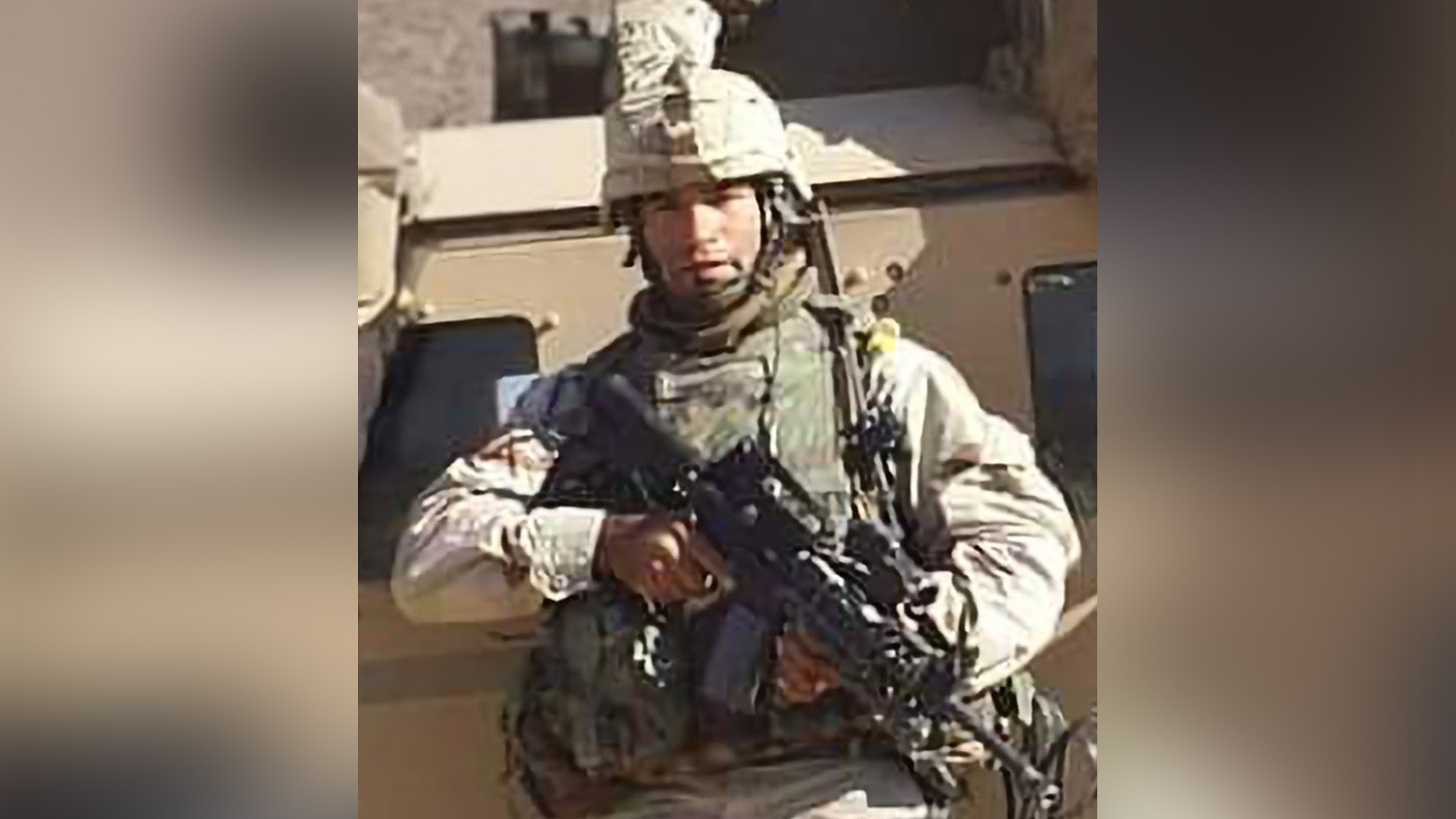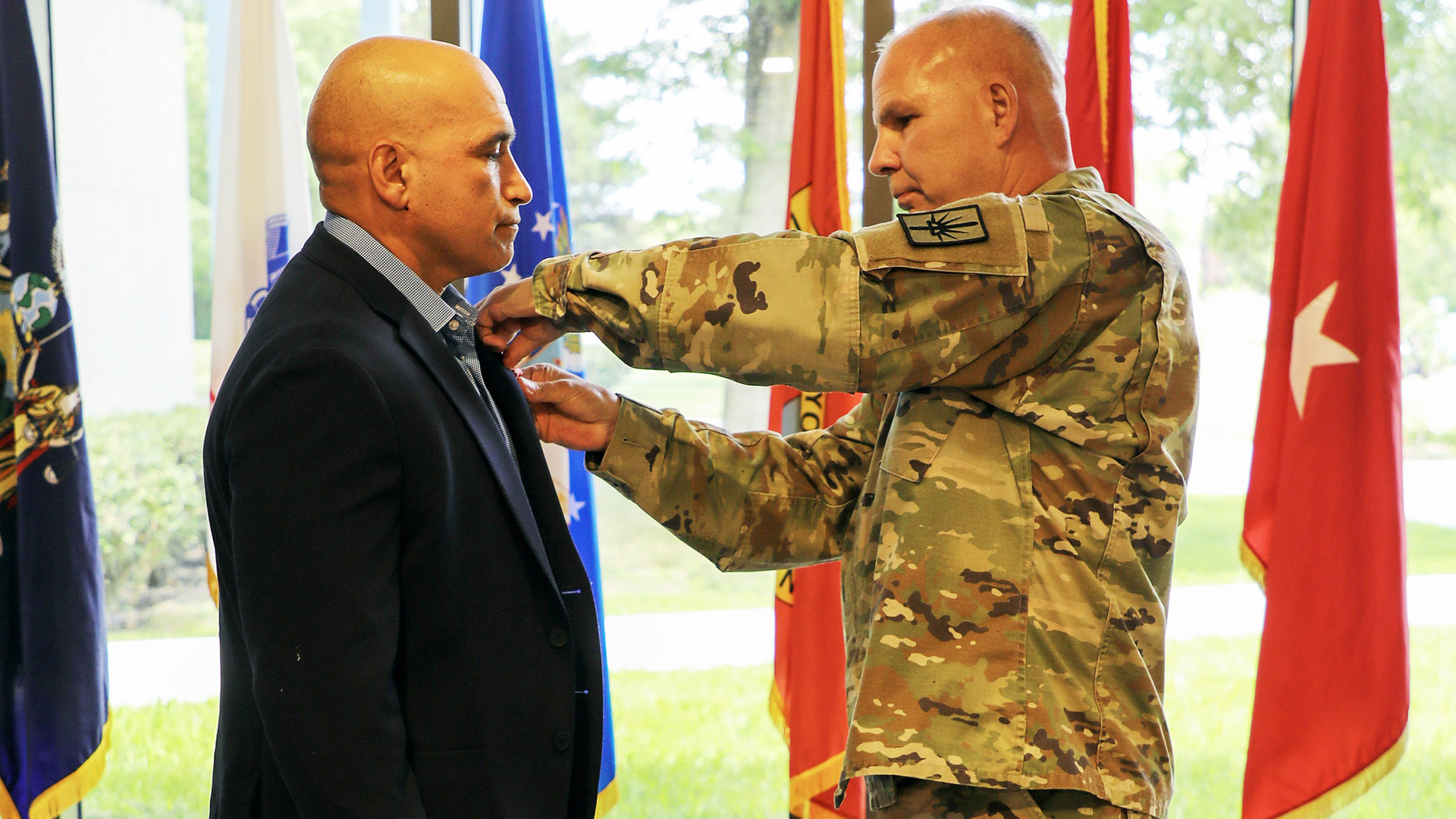
On April 11, 2004, then-Staff Sgt. Luis Barsallo’s platoon was hit by a “perfectly executed ambush on behalf of the insurgents” in Samarra, Iraq.
“We were getting shot at from 12 o’clock, 6 o’clock, 3 o’clock, and 9 o’clock – so 360 degrees,” Barsallo told Task & Purpose. “Mortar rounds were coming in, bullets were flying. We could see the insurgents running around with the RPG [rocket-propelled grenades], trying to maneuver. They had plenty of time to set something like that up. Hollywood couldn’t have made a better scene.”
More than 20 years later Barsallo was finally recognized for his bravery in Iraq in April and May 2004 by receiving the Bronze Star with “V” device last month. Barsallo, who retired from the New York Army National Guard in 2020 as a master sergeant, said he views the award as a “team trophy.”
“It’s kind of in a sense humbling, because I know that without my guys, my squad, if it wasn’t for them, I wouldn’t have been able to be the leader that I am,” Barsallo said. “This was for the squad. Of the entire platoon, we’re the only squad that made it back with a complete squad.”
In 2004, Barsallo was assigned to the New York Army National Guard’s C Company, 2nd Battalion, 108th Infantry Regiment, which was attached to the 1st Infantry Division, a National Guard news release says.
He was serving as a squad leader when his soldiers were ordered to go into Samarra and sweep a section of the city. The resulting fight became known as the “Battle of Easter Sunday.”
Subscribe to Task & Purpose today. Get the latest military news and culture in your inbox daily.
As their convoy approached the city, the 5-ton truck in front of Barsallo’s vehicle was hit by an RPG. One soldier was killed: Army Pvt. 1st Class Nathan Brown. Six other soldiers were badly wounded.
At the same time the truck was hit by an RPG, a roadside bomb exploded, Barsallo recounted. He moved his vehicle off to the side of the road and ordered his squad to dismount. They started to fight the insurgents to break the ambush.
Barsallo and his soldiers were taking mortar fire from their left, and if they tried to push into Samara, they faced small arms and RPG fire, he said. For Barsallo, the situation felt a lot like the Omaha Beach scene from Saving Private Ryan when the movie goes into slow motion.

“The only way I can explain it is it was something out of Hollywood,” Barsallo said. “As we were moving the vehicle, we were getting [shot at]. When we dismounted, it was even worse because you could hear the bullets whizzing by and then you could see them when they impacted the buildings.”
With the battle raging, Barsallo went into the kill zone and drove the 5-ton truck to a blocking position so that his squad could fire at the insurgents from cover while the wounded soldiers were evacuated.
“We just needed to get our guys out of there,” Barsallo said. “We needed to get the wounded out of there. That was more important. And we did not want to be the next casualties in that kill zone.”
Barsallo then led an assault by his squad on the insurgent positions until a quick reaction force arrived. When help arrived, Barsallo had his soldiers clear several blocks on foot before he felt it was safe enough for them to get back in their vehicles.
Army Maj. Gen. Ray Shields, the adjutant general of New York, credited Barsallo with saving the lives of fellow soldiers by staying calm and directing fire on enemy positions.
“He put himself in immediate and direct harm’s way to save his fellow Soldiers,” Shields said in a National Guard news release. “Luis was determined that others would not die that night.”
The following month, Barsallo once again seized the initiative under fire. On May 29, his squad came under fire from insurgent rocket propelled grenades and small arms.
Barsallo braved enemy fire to run to a machine gun position, taking charge of the crew and directing fire at the insurgents. Two enemy fighters were killed, and the rest of the enemy force retreated.
As was the case during the April battle, the enemy fire was intense, Barsallo said. One soldier told him afterward that before he broke cover to run to the M-240B machine gun, so many rounds had hit the wall behind him that they drew an outline of his body.
The reason why Barsallo’s Bronze Star with “V” device was awarded 20 years after these battles is the original paperwork for his award was lost, said Major Katie Schin, the executive officer of the New York National Guard Recruiting and Retention Battalion. nSchin and others resubmitted the award, and that involved finding officers who would signed the awards in 2004, the National Guard news release says.
Barsallo said he understands how the paperwork for his award was misplaced. The ops tempo at the time was very heavy, so the 1st Infantry Division was sent back to Iraq after getting some time home to recover from the deployment.
His Bronze Star with “V” award packet was submitted four times and rejected over administrative issues, said Barsallo, who added he believes a soldier who served in Samarra at the time eventually received the paperwork and he recognized the names of the commanders, so he knew it was a real event.
Receiving the award after so many years brings back both good and bad memories for Barsallo, who has been contemplating what he and his unit could have done better in Iraq. He also said that his award shows that leaders can only succeed if they have good people, like the soldiers in his squad.
“They give you the responsibility of taking care of people,” he said. “So, now you have the responsibility of people’s lives in your hands with the decisions that you make – and you cannot be careless with them. So, they make you better as a leader and you learn just as much and without them, you can’t be that leader because you cannot concentrate on leader tasks if the people underneath do not respect and have confidence in your ability.”
